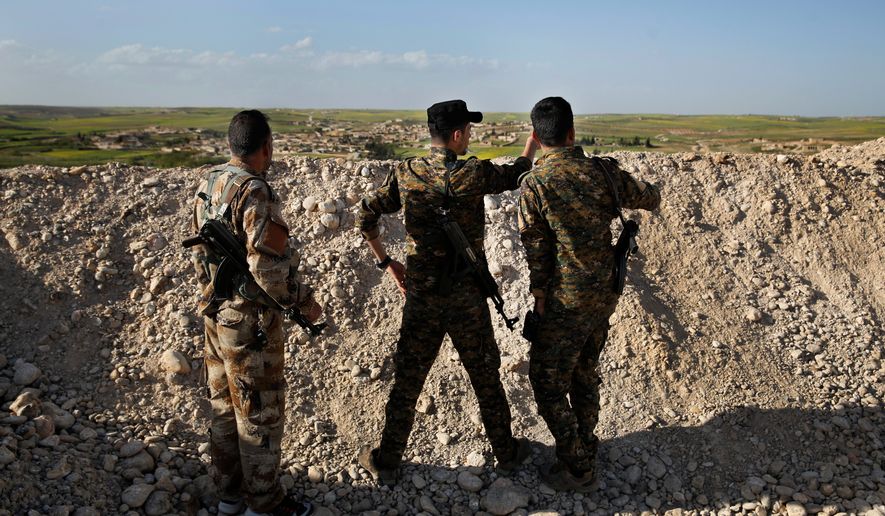U.S. and Turkish military patrols have begun operating in the highly strategic northern Syrian enclave of Manbij, heading off a feared clash between the two NATO allies but potentially leaving the Pentagon’s Kurdish allies in the region shortchanged once again.
Turkish military officials announced the joint military operations on social media Monday, part of a deal struck between Secretary of State Mike Pompeo and Turkish Foreign Minister Mevlut Cavusoglu to cool tensions over Turkish fears of rising Kurdish influence on its border. Turkey has long dealt with a violent Kurdish separatist movement inside the country.
U.S. military officials did not comment, but Defense Secretary James Mattis told reporters last week that joint U.S.-Turkish patrols were slated to begin in the city within days.
The northern Syrian city is ground zero for U.S. military operations against Islamic State in the country, but Turkey threatened to attack it to head off growing Kurdish influence across northern Syria, where the government of President Bashar Assad has no influence. The Pentagon has allied with Kurdish-Arab militias in the region in the fight against Islamic State.
U.S. forces continue to train and equip Kurdish militia fighters in Manbij as the offensive against Islamic State continues. Turkey has labeled the groups as an offshoot of terrorist organizations.
Although the joint U.S.-Turkish patrols have calmed tensions in Manbij for the time being, the U.S. must still walk a fine line — continuing to appease Ankara while not completely abandoning its Kurdish allies.
“It’s a complex issue. It is the most complex battle space I have seen,” Mr. Mattis told reporters this month ahead of bilateral talks with Turkish officials at NATO headquarters in Brussels.
“How do we take Turkey’s legitimate security interests [in Syria] and enhance their security? They are the only NATO nation with an active insurgency inside its borders.”
But Mr. Mattis said the U.S. and its allies would be courting disaster in the Middle East if they abandon the Syrian Kurdish groups, such as the Syrian Democratic Forces.
“The SDF was the only organization that was able to throw ISIS off track and defeat them in the field in very, very tough fighting,” he said. “We will not simply cast that organization aside, because it is critical to defeating the ISIS caliphate and preventing the rise of ISIS 2.0.”
Tensions between U.S. and Turkish forces were at risk of exploding in February when Turkey threatened to expand its incursion into Syria to target Kurdish forces in Manbij, where a number of U.S. special operations forces are also based.
“If they do not withdraw from Manbij, then we will go to Manbij, we will go east of the Euphrates,” Turkish Deputy Prime Minister Bekir Bozdag said at the time, adding that Turkish troops could target U.S. forces in Manbij.
Roughly 200 Turkish troops are deployed in and around Manbij, with more forces expected to be sent in as part of the road map, says Ankara. Approximately 2,000 American troops are stationed in the city and elsewhere across Syria, according to Pentagon figures.
• Carlo Muñoz can be reached at cmunoz@washingtontimes.com.




Please read our comment policy before commenting.